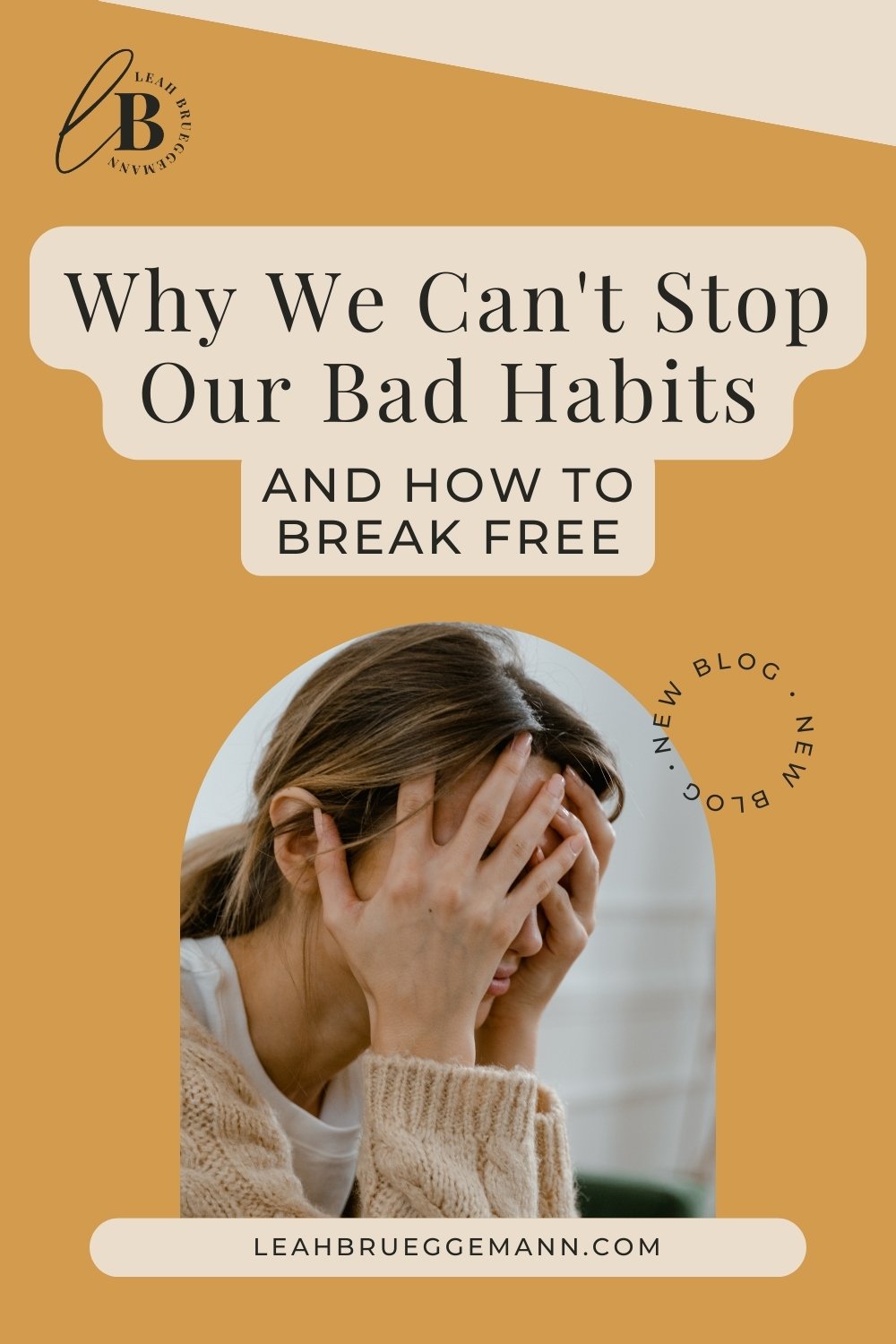Why We Can't Stop Our Bad Habits (and How to Break Free)
We all struggle with them – those persistent habits we know aren't good for us, yet we can't seem to shake. Whether it's indulging in sugary treats every night, staying glued to our screens until bedtime, or neglecting regular exercise, these patterns can be incredibly frustrating and have a significant impact on our hormonal health.
Beyond frustration, these habits can disrupt our delicate hormonal balance, leading to a cascade of negative symptoms. From fatigue and weight gain to mood swings and sleep disturbances, imbalanced hormones can wreak havoc on our physical and emotional well-being.
And the thing is, sometimes it’s more our mindset that’s holding us back than anything else. I’ve seen so many people who have been “doing all the right things” but they mentally don’t believe that change is possible so they unknowingly end up sabotaging their efforts.
The good news is, breaking free from these patterns is possible! By understanding the underlying reasons behind our behaviors and adopting healthier alternatives, we can create a life that not only aligns with our values and dreams but also fosters optimal hormonal health.
The Unconscious Mind Guiding Our Habits
The term "unconscious mind" may sound mysterious and “woo woo”, but it just means the part of our mind that operates outside of our conscious awareness. It's estimated to be responsible for a whopping 95% of our daily actions and decisions(!!!), making it a powerful force shaping our lives. This unconscious mind is like a complex software program, and the crucial coding period for this program happens during our early childhood experiences, from about ages 0 to 7.
Think of it like this: imagine a child experiencing a situation where they feel unsafe or unloved. This can lead to developing a core belief like "I'm not worthy" or "The world is scary." These beliefs become deeply ingrained in the unconscious mind, acting like a pre-programmed code that continues to run in the background, influencing our thoughts, feelings, and behaviors even as adults.
The problem is, these early beliefs might not be accurate or helpful in our adult lives. For example, a person who formed the belief "I'm not worthy" in childhood might struggle with self-esteem and engage in self-sabotaging behaviors like procrastination or self-criticism. These behaviors, while seemingly negative, might unconsciously serve as a form of self-protection. By not putting themselves out there, they avoid the potential risk of experiencing rejection or failure, which aligns with their core belief of not being good enough.
Obviously, the unconscious mind plays a crucial role in shaping our habits. But by acknowledging the potential influence of our past experiences, we can begin to rewrite the "code" of our unconscious mind and create new, healthier patterns for the future. Let's dive deeper into how it specifically affects our hormonal health.
The most common way our mindset affects our hormonal health is stress, which significantly impacts our cortisol hormone.
When we're constantly stressed, our bodies produce excessive cortisol, which can disrupt sleep patterns, interfere with blood sugar regulation, and contribute to weight gain. Understanding this connection between our habits and hormonal health is critical. It empowers us to take control and make conscious choices that support our wellbeing.
Shifting Your Inner Dialogue: From Critic to Compassionate Coach
The way we talk to ourselves plays a significant role in shaping our emotional wellbeing and our ability to change. When it comes to breaking free from negative habits that impact our hormones, shifting your inner dialogue from a harsh critic to a compassionate coach becomes even more crucial.
Here's how you can do it:
1. Recognize "Childhood Programming"
The first step is acknowledging the potential influence of your early childhood experiences on your current behaviors doesn't involve dwelling on past traumas, but rather becoming aware of the possibility that some of your ingrained beliefs might be driving your habits. Perhaps your tendency to procrastinate stems from a fear of failure formed in childhood. Or your emotional eating could be linked to a subconscious need for comfort due to unmet emotional needs in your early years.
2. Reframe Your Self-Talk
Instead of beating yourself up for falling back into your old patterns, practice self-compassion. When you catch yourself engaging in negative self-talk, like "I'm so weak for doing this again," gently challenge those thoughts. Reframe them with understanding, acknowledge the underlying need and offer yourself encouragement. For example, try saying, "It's understandable that I'm seeking this temporary comfort, but I'm learning new ways to take care of myself. I'm going to be patient with myself in this process."
3. Use Positive Affirmations
Positive affirmations are powerful tools for rewiring your inner dialogue and reinforcing positive beliefs. Choose affirmations that resonate with your goals and repeat them to yourself regularly, especially when facing challenges. Examples include "I am capable and worthy," "I am learning and growing," or "I am worthy of love and support."
4. Cultivate Self-Compassion
Self-compassion is not the same as self-pity. It's about treating yourself with kindness, understanding, and forgiveness, just like you would treat a loved one going through a difficult time. When you stumble, remind yourself that everyone makes mistakes, and it's part of the learning process. Offer yourself support and encouragement to move forward.
By replacing self-criticism with self-compassion and actively reframing your inner dialogue, you create a supportive internal environment that empowers you to break free from negative habits and create lasting, positive changes in your hormonal health.
Cultivating New, Positive Routines
The journey towards lasting change often involves building new, positive routines rather than solely focusing on breaking bad habits. This approach acknowledges that our habits serve a purpose, and instead of simply eliminating that purpose, we offer healthier alternatives to fulfill the same needs.
Understanding the Need Behind the Habit
The key first step is to identify the underlying need fueling your bad habit. Is it a need for comfort, a way to avoid difficult emotions, or a coping mechanism for stress? Once you understand the need, you can explore healthier ways to address it.
Building New Routines:
Here are some strategies to build new routines that replace your old habits:
Identify healthy alternatives: If your habit is emotional eating, consider activities like exercise, journaling, spending time in nature, or relaxation techniques like meditation or deep breathing. These activities can help you manage stress and regulate emotions in a healthy way.
Start small and build gradually: Don't try to overhaul your entire life overnight. Introduce small, sustainable changes and gradually build upon them. For example, if you want to exercise more, start with a 10-minute walk each day and progressively increase the duration and intensity as you build your fitness level.
Make it enjoyable: Choose activities that are fun for you! This will increase your chances of sticking with them over the long term.
Set realistic goals and celebrate your progress: Don't set yourself up for failure with unrealistic expectations. Start with achievable goals and celebrate even small victories along the way. This will keep you motivated and on track.
Incorporate rewards: Reward yourself for sticking to your new routines. This positive reinforcement helps solidify the new behavior and makes it more likely to become a lasting habit.
Let's say your bad habit is late-night snacking due to stress, which can disrupt your blood sugar levels and sleep patterns. By understanding the need for comfort and stress management, you could:
Identify healthy alternatives: Try journaling to express and process your emotions, take a warm bath before bed, or practice deep breathing exercises to manage stress. These activities can help regulate cortisol levels and promote relaxation.
Start small: Begin by journaling for 5 minutes before bed, taking a bath once a week, or practicing deep breathing for a few minutes each day.
Make it enjoyable: Choose journaling prompts you find interesting, light candles for a relaxing bath, or find a guided meditation app that resonates with you.
Building new routines takes time and consistent effort. Be patient with yourself, celebrate your progress, and don't be discouraged by occasional setbacks. It’s all about consistency over perfection! By focusing on building new positive habits that fulfill the same needs as your old ones and support hormonal balance, you can gradually create lasting change and move towards a healthier and happier life.
By embracing these ideas and the tricks we talked about, you're basically giving yourself a toolbox to totally shift your relationship with those unhealthy habits. This might just be the step you’ve needed to really kickstart your health journey. Remember, you've got the power to ditch the past and create the future you've always wanted. You got this!
Switch & Ditch Guide
Non-Toxic Product Swaps
Simple product swaps and recommendations to help you remove toxins and chemicals from your life! This guide will support you in choosing less toxic options when it's time to purchase your everyday products again.
The recommendations presented in this blog are not a substitute for medical advice from a qualified doctor. Before making any changes to your diet and lifestyle, please consult with your health care provider.
Some of these links contain affiliate links.





